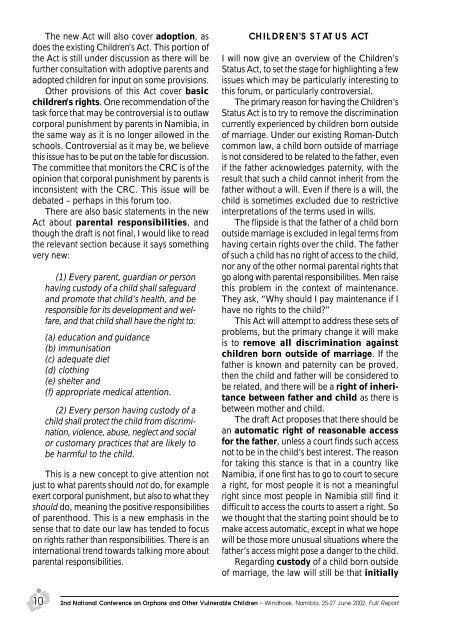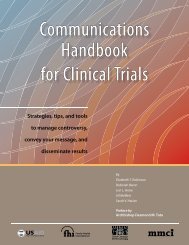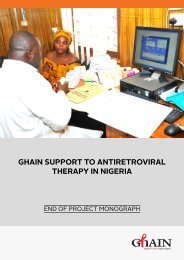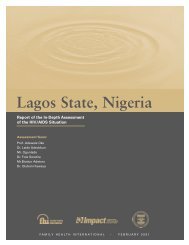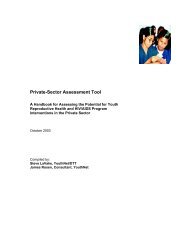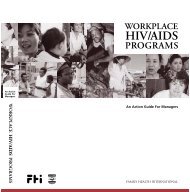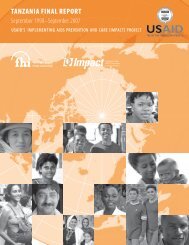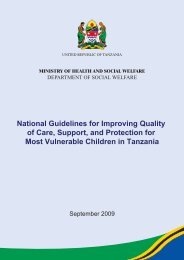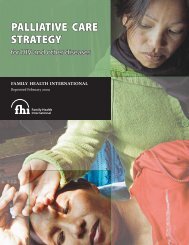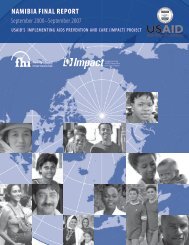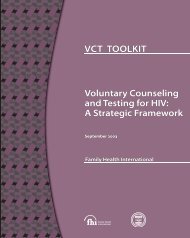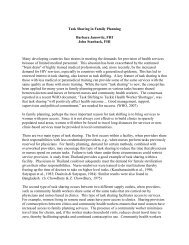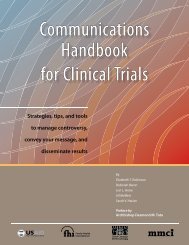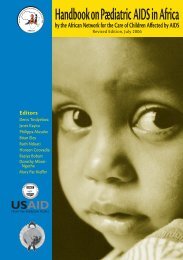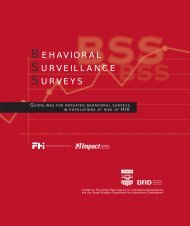2nd National Conference on Orphans and Other ... - FHI 360
2nd National Conference on Orphans and Other ... - FHI 360
2nd National Conference on Orphans and Other ... - FHI 360
You also want an ePaper? Increase the reach of your titles
YUMPU automatically turns print PDFs into web optimized ePapers that Google loves.
The new Act will also cover adopti<strong>on</strong>, as<br />
does the existing Children’s Act. This porti<strong>on</strong> of<br />
the Act is still under discussi<strong>on</strong> as there will be<br />
further c<strong>on</strong>sultati<strong>on</strong> with adoptive parents <strong>and</strong><br />
adopted children for input <strong>on</strong> some provisi<strong>on</strong>s.<br />
<strong>Other</strong> provisi<strong>on</strong>s of this Act cover basic<br />
children’s rights. One recommendati<strong>on</strong> of the<br />
task force that may be c<strong>on</strong>troversial is to outlaw<br />
corporal punishment by parents in Namibia, in<br />
the same way as it is no l<strong>on</strong>ger allowed in the<br />
schools. C<strong>on</strong>troversial as it may be, we believe<br />
this issue has to be put <strong>on</strong> the table for discussi<strong>on</strong>.<br />
The committee that m<strong>on</strong>itors the CRC is of the<br />
opini<strong>on</strong> that corporal punishment by parents is<br />
inc<strong>on</strong>sistent with the CRC. This issue will be<br />
debated – perhaps in this forum too.<br />
There are also basic statements in the new<br />
Act about parental resp<strong>on</strong>sibilities, <strong>and</strong><br />
though the draft is not final, I would like to read<br />
the relevant secti<strong>on</strong> because it says something<br />
very new:<br />
(1) Every parent, guardian or pers<strong>on</strong><br />
having custody of a child shall safeguard<br />
<strong>and</strong> promote that child’s health, <strong>and</strong> be<br />
resp<strong>on</strong>sible for its development <strong>and</strong> welfare,<br />
<strong>and</strong> that child shall have the right to:<br />
(a) educati<strong>on</strong> <strong>and</strong> guidance<br />
(b) immunisati<strong>on</strong><br />
(c) adequate diet<br />
(d) clothing<br />
(e) shelter <strong>and</strong><br />
(f) appropriate medical attenti<strong>on</strong>.<br />
(2) Every pers<strong>on</strong> having custody of a<br />
child shall protect the child from discriminati<strong>on</strong>,<br />
violence, abuse, neglect <strong>and</strong> social<br />
or customary practices that are likely to<br />
be harmful to the child.<br />
This is a new c<strong>on</strong>cept to give attenti<strong>on</strong> not<br />
just to what parents should not do, for example<br />
exert corporal punishment, but also to what they<br />
should do, meaning the positive resp<strong>on</strong>sibilities<br />
of parenthood. This is a new emphasis in the<br />
sense that to date our law has tended to focus<br />
<strong>on</strong> rights rather than resp<strong>on</strong>sibilities. There is an<br />
internati<strong>on</strong>al trend towards talking more about<br />
parental resp<strong>on</strong>sibilities.<br />
CHILDREN’S STATUS ACT<br />
I will now give an overview of the Children’s<br />
Status Act, to set the stage for highlighting a few<br />
issues which may be particularly interesting to<br />
this forum, or particularly c<strong>on</strong>troversial.<br />
The primary reas<strong>on</strong> for having the Children’s<br />
Status Act is to try to remove the discriminati<strong>on</strong><br />
currently experienced by children born outside<br />
of marriage. Under our existing Roman-Dutch<br />
comm<strong>on</strong> law, a child born outside of marriage<br />
is not c<strong>on</strong>sidered to be related to the father, even<br />
if the father acknowledges paternity, with the<br />
result that such a child cannot inherit from the<br />
father without a will. Even if there is a will, the<br />
child is sometimes excluded due to restrictive<br />
interpretati<strong>on</strong>s of the terms used in wills.<br />
The flipside is that the father of a child born<br />
outside marriage is excluded in legal terms from<br />
having certain rights over the child. The father<br />
of such a child has no right of access to the child,<br />
nor any of the other normal parental rights that<br />
go al<strong>on</strong>g with parental resp<strong>on</strong>sibilities. Men raise<br />
this problem in the c<strong>on</strong>text of maintenance.<br />
They ask, “Why should I pay maintenance if I<br />
have no rights to the child?”<br />
This Act will attempt to address these sets of<br />
problems, but the primary change it will make<br />
is to remove all discriminati<strong>on</strong> against<br />
children born outside of marriage. If the<br />
father is known <strong>and</strong> paternity can be proved,<br />
then the child <strong>and</strong> father will be c<strong>on</strong>sidered to<br />
be related, <strong>and</strong> there will be a right of inheritance<br />
between father <strong>and</strong> child as there is<br />
between mother <strong>and</strong> child.<br />
The draft Act proposes that there should be<br />
an automatic right of reas<strong>on</strong>able access<br />
for the father, unless a court finds such access<br />
not to be in the child’s best interest. The reas<strong>on</strong><br />
for taking this stance is that in a country like<br />
Namibia, if <strong>on</strong>e first has to go to court to secure<br />
a right, for most people it is not a meaningful<br />
right since most people in Namibia still find it<br />
difficult to access the courts to assert a right. So<br />
we thought that the starting point should be to<br />
make access automatic, except in what we hope<br />
will be those more unusual situati<strong>on</strong>s where the<br />
father’s access might pose a danger to the child.<br />
Regarding custody of a child born outside<br />
of marriage, the law will still be that initially<br />
10 <str<strong>on</strong>g>2nd</str<strong>on</strong>g> <str<strong>on</strong>g>Nati<strong>on</strong>al</str<strong>on</strong>g> <str<strong>on</strong>g>C<strong>on</strong>ference</str<strong>on</strong>g> <strong>on</strong> <strong>Orphans</strong> <strong>and</strong> <strong>Other</strong> Vulnerable Children – Windhoek, Namibia, 25-27 June 2002: Full Report


